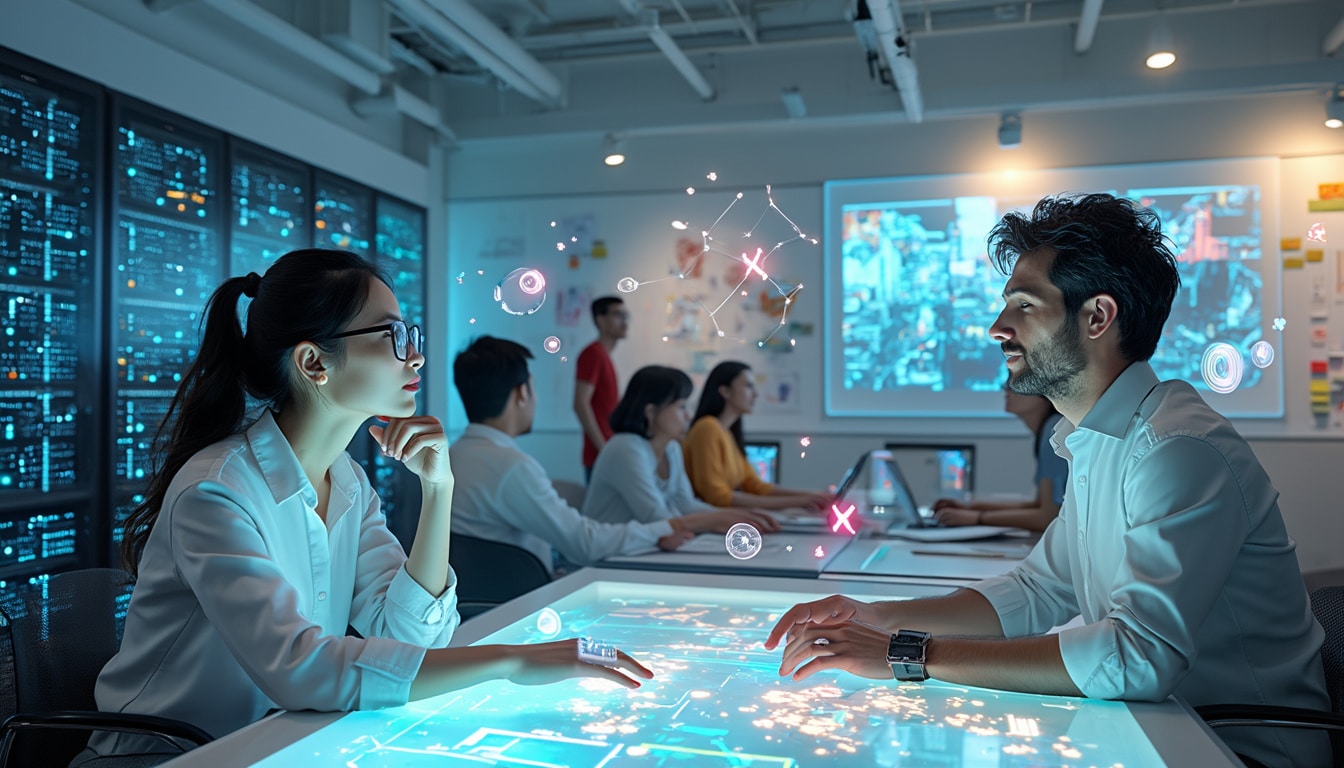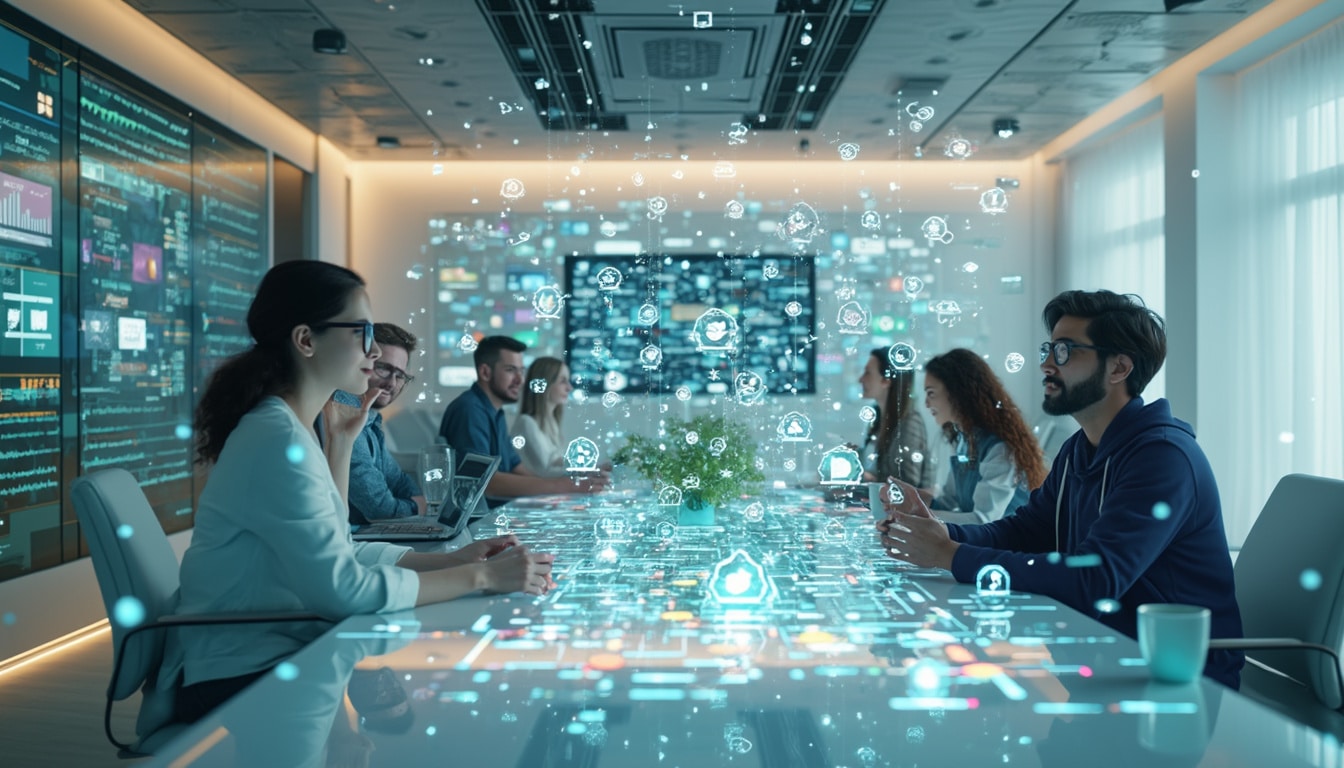The digital era is undergoing a full revolution thanks to artificial intelligence. Algorithms and automation are redefining how brands interact with their audiences. This transformation opens up new opportunities for digital marketing agencies.
The massive data generated by multiple touchpoints present both challenges and unprecedented perspectives. Thanks to AI, it is now possible to create highly personalized experiences at scale. Campaigns become smarter, adapting in real-time to consumer behaviors. Together, let’s explore how artificial intelligence propels digital marketing to new heights.

“`html
Table of Contents
Togglehow artificial intelligence is redefining digital marketing
In the era of rapid technological advancements, artificial intelligence (AI) has ushered in a new age for marketers. Algorithms, data, and automation are transforming how brands connect with their audiences. For digital advertising agencies, the rise of AI represents much more than just an evolution; it is a seismic shift that redefines strategic thinking, campaign execution, and the dynamics between agencies and their clients.
With the proliferation of digital touchpoints across the web, mobile, streaming, and emerging platforms, the ocean of consumer data presents both challenges and opportunities. Traditional methods of media planning, audience segmentation, and creative optimization are starting to show their limits in the face of this tsunami of information. This is where AI steps in to bridge the gap, enabling customer experiences that are far more personalized, relevant, and timely, at scale.
According to McKinsey & Company, “AI applied to marketing can enable much more personalized, relevant, and timely customer experiences, at scale.” The ability of AI to analyze billions of data points, discern patterns, and predict behaviors surpasses even the most sophisticated human analyses. For agency leaders, adopting AI is no longer a competitive differentiator but an absolute necessity.
To learn more about digital marketing trends, check out the digital marketing trends for 2025.
what is hyper-personalization and why is it crucial
One of the most impactful applications of AI in marketing is hyper-personalization. While traditional segmentation involved grouping consumers by demographics or interests, AI allows for dynamic and algorithmic targeting that personalizes messages at the individual level. Machine learning models analyze behavioral data, engagement metrics, purchase history, and contextual signals to generate extremely granular audience profiles in real-time.
This advanced personalization enables AI-powered engines to adapt creative assets, offers, and messages for each user, delivering not only the right message but also at the right time and contact point. For example, Netflix uses AI-based recommendation systems that, according to a report from The Verge, influence over 80% of the content streamed on the platform. Although Netflix originally started as a content company, its success underscores a universal truth for all digital brands: personalized user experiences are the new battleground for attention.
To discover inspiring viral marketing campaigns, visit this link.
how automation is transforming advertising campaigns
If the logistical pillar of digital advertising – media buying, bidding, budget allocation – was once a manual or rule-based process, AI and machine learning have injected automation into these workflows. This has led to the creation of “smart campaigns” that self-optimize based on live data flows.
Programmatic advertising, in particular, has been revolutionized by AI. Platforms like The Trade Desk, Google Ads, and Facebook (Meta) use AI-powered engines to instantly evaluate millions of ad impressions, dynamically bidding on placements most likely to convert. As Forrester notes, “AI-powered programmatic advertising has now become the default approach in most digital markets.”
Automation does not stop at media buying. Creative generation, copy optimization, and A/B testing are also being transformed. AI solutions such as Persado and Phrasee generate and refine variations of advertising copies, identifying the language that resonates with specific audience segments. According to Persado, leading brands have seen an increase of up to 41% in engagement thanks to experimentation with AI-generated messages.
To learn more about the best SEO agencies and key trends, visit this link.
what role do data play in AI-powered marketing
To fully harness the potential of AI in marketing, data serves as the essential fuel for this engine. The quality, availability, and ethical management of data are critical to the effectiveness of AI-powered campaigns. Leaders must face profound changes related to privacy, regulation, and first-party data strategies.
The disappearance of third-party cookies and growing consumer privacy concerns have prompted businesses to turn to direct data collection and value exchanges. Stephanie Liu, a principal analyst at Forrester, observed on Digiday that “agencies are under pressure to help clients leverage their own data without violating privacy laws.”
Zero-party data – information that users willingly share – has become a valuable resource for AI-powered marketing. Agencies are now tasked with designing experiences and incentives that encourage open data sharing while maintaining transparency and trust. Meanwhile, advances in federated learning and differential privacy promise to allow useful AI models without direct data exposure.
To understand the fundamentals of digital marketing, check out this article.
how predictive and prescriptive analytics are revolutionizing marketing
The impact of AI is not limited to what is, but extends powerfully to what could be. By using predictive analytics, agencies can estimate not only which audiences are most likely to convert but also when, where, and how future behaviors might unfold. AI models integrate various data – internal CRM, social sentiment, purchase behaviors, macroeconomic trends – to generate actionable forecasts.
Gartner has predicted that “by 2025, 75% of B2B sales organizations will integrate AI-driven insights into their traditional sales playbooks.” Beyond prediction, there is prescription. Modern AI platforms do not merely anticipate outcomes—they recommend the optimal sequence of actions to maximize results. These prescriptive analytics serve as a virtual strategist, guiding everything from media allocation to creative messaging.
A concrete example of data-driven decision-making is illustrated by a digital marketing graduate at Johnson & Johnson, who uses data-based decisions to enhance campaigns, as detailed in this article.
To dive deeper into digital marketing trends, visit this link.
how AI and human creativity can collaborate
A common concern is that the rise of AI heralds the obsolescence of human creativity. In reality, the future is hybrid. AI can analyze resonance, optimize copies, and suggest visuals, but it cannot create the essence of a brand or the emotional nuance on its own. Agencies ready for the AI-powered era will enable creatives to work in harmony with data and machine intelligence.
As Harvard Business Review notes, “AI can generate a large number of variations, but humans must provide the strategic direction and brand context.” Forward-thinking leaders will invest in building multidisciplinary teams – combining creative visionaries, technical leaders, and data scientists. The result is a new creative paradigm: iterative, test-based, and deeply informed by real-time audience feedback.
This collaboration not only allows for real-time optimization of campaigns but also maintains an authentic connection with audiences. To explore inspiring examples of creative campaigns, check out this link.
how agencies must evolve to integrate AI
Adapting to the age of AI-powered marketing requires more than just technological adoption – it demands a complete organizational shift. Agency leaders must promote data literacy across all departments, foster a culture of experimentation, and reconfigure internal workflows.
Roles are evolving. Data engineers, machine learning specialists, and ethicists join copywriters and strategists in the modern agency. Partnerships with AI vendors and martech platforms become central to service offerings. This transformation also involves reevaluating client expectations: agencies are now expected not only to deliver campaigns but also intelligent systems that are always active, learning, and continuously improving, marking a shift from project-based relationships to value-based ones.
To discover how digital trends are shaping the future, visit this link.
what are the ethical challenges of AI in marketing
As AI integrates into marketing, issues of algorithmic bias, transparency, and accountability become paramount. Bias in training data can inadvertently reinforce stereotypes or exclude segments, leading to reputational and financial risks. Leaders must prioritize ethical AI practices: rigorous data audits, explainable AI solutions, and clear communication with stakeholders about algorithmic decisions.
Compliance with frameworks such as the EU’s AI Act or sector-specific guidelines is no longer optional. Trust has become a prerequisite. As consumers become more aware of the role of AI in shaping their digital experiences, transparency about data usage and decision-making logic will differentiate leading agencies.
To learn more about best practices in digital marketing, check out this article.
how to harness the transformative potential of AI-powered marketing
The era of AI-powered marketing is not a distant prospect – it is the current reality for digital advertising agencies. Those that harness the transformative potential of AI, while wisely aligning it with human intuition and creativity, will set the standards for customer value and industry innovation.
Agency leaders have reached a crucial crossroads. The imperative is not merely to adopt new tools but to reimagine every facet of marketing operations through the lens of AI – strategy, creativity, execution, measurement, and ethics. By doing so, agencies can unlock a new horizon of growth, relevance, and impact.
To explore examples of data-driven decision-making, visit this article.







